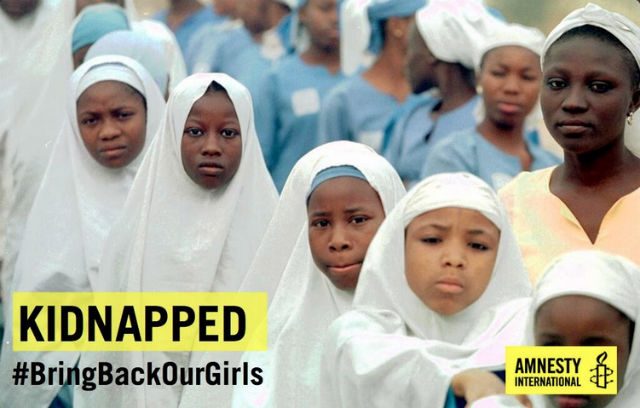SUMMARY
This is AI generated summarization, which may have errors. For context, always refer to the full article.

KANO, Nigeria – World powers, including the United States and China, have joined in the search for the more than 200 schoolgirls abducted by Boko Haram Islamists who have also killed hundreds in the country’s northeast this week.
Amid global outrage over the kidnapping of the teenagers, the United States and France are sending specialist teams to Nigeria, while London has agreed to deploy “satellite imaging capabilities.”
China promised to supply “any useful information acquired by its satellites and intelligence services” to Nigeria.
The police on Wednesday police offered $300,000 (215,000 euros) for information leading to the rescue of the girls.
The latest insurgent attack targeted the town of Gamboru Ngala on the border with Cameroon, where gunmen this week razed scores of buildings and fired on civilians as they tried to flee.
Area Senator Ahmed Zanna put the death toll at 300, citing information provided by locals, in an account supported by numerous residents.
Zanna said the town had been left unguarded because soldiers based there had been redeployed north towards Lake Chad in an effort to rescue the kidnapped girls.
Nigeria’s response to the kidnappings has been widely criticized, including by activists and parents of the hostages who say the military’s search operation has been inept so far.
President Goodluck Jonathan’s administration has sought to appear more engaged with the plight of the hostages in recent days, especially after Boko Haram chief Abubakar Shekau released a video threatening to sell the girls as “slaves.”
In a second kidnapping, 11 more girls aged 12 to 15 years were seized Sunday from Gwoza, an area not far from Chibok and also in Borno state, Boko Haram’s base.
The group’s 5-year uprising has killed thousands across Africa’s most populous country and top economy, with many questioning whether Nigeria has the capacity to contain the violence.
Charred bodies, throats cut
Islamist fighters riding in armoured trucks and on motorcycles stormed Gamboru Ngala after midday on Monday, May 5.
The extremists overran the town, making it too dangerous for locals to immediately return, survivors said.
When the militants left, residents discovered their town “littered” with dead bodies, Musa Abba, a witness, told Agence France-Presse.
“All economic and business centers have been burnt. The market in the town which attracts traders from all over the area…has been completely burnt,” the senator said.
Gamboru Ngala has been attacked repeatedly in the past but Abba said “this (was) the worst Boko Haram attack (the town) has seen.”
The Cameroonian military has reinforced security in the town of Fotokol on the Nigerian border, a medical official told AFP by phone, requesting anonymity.
“The toll is very heavy. We believe there are more than 200 dead,” the source said, adding that 2,000 Nigerians, including soldiers had fled to Cameroon.
“Some of the bodies were charred. It was horrific. People had their throats slit, others were shot,” the source added.
In a fresh attack, suspected Boko Haram militants killed on Wednesday 7 people in Buji-Buji village, also in Borno state, the village head, Mohammed Garba told journalists.
“Gunmen numbering about 20 invaded our village around 3:00 am (0200 GMT) while most people were sleeping….The gunmen opened fire on people as they attempted to escape from the ravaging fire.
“Seven persons died on the spot, while so many others were injured,” he said.
West joins hostage search
US President Barack Obama has described the Chibok abductions as “heartbreaking” and “outrageous” and announced that a team of military experts had been sent to help Nigeria’s rescue mission.
Michelle Obama expressed sympathy for the schoolgirls, in a personal message on Twitter.
“Our prayers are with the missing Nigerian girls and their families. It’s time to #BringBackOurGirls,” said the US First Lady on her @FLOTUS account, with a picture of her solemnly holding a sign saying #BringBackOurGirls” scribbled in black on white paper.
The tweet was signed “mo,” meaning she wrote it herself, and it was retweeted more than 8,500 times in just a few hours.
British Prime Minister David Cameron condemned the kidnappers as “pure evil” and said a small team of planning and coordinating specialists would head to Nigeria to advise on the search.
French Foreign Minister Laurent Fabius said a “special team” was at Nigeria’s disposal, while Jonathan said that visiting Chinese Premier Li Keqiang had also pledged assistance.
Analysts said Jonathan’s acceptance of Western military assistance suggested an admission that he can no longer manage the Boko Haram uprising without help.
As well as mounting pressure over the kidnappings, Nigeria has been hit by a spate of bombings.
Just a few hours before the mass abduction in Chibok, a car bombing at a bus station on the outskirts of Abuja killed 75 people.
A copycat bombing at the same station killed 19 people on May 1.
To contain the violence, Jonathan a year ago imposed a state of emergency in the northeast where he sent thousands of troops to flush out the insurgents, but critics say the offensive has achieved almost nothing.
World meet overshadowed
Jonathan had hoped that a World Economic Forum summit which opened in Abuja Wednesday would highlight Nigeria’s economic progress.
Meeting Jonathan in Abuja ahead of the summit, China’s Li pledged stronger cooperation with Nigeria, Africa’s top oil producer, but public focus has remained fixed on Boko Haram.
Amid the outrage over the kidnappings and the bombings, Nigeria has promised the World Economic Forum will be kept safe by the 6,000 troops deployed across the capital.
The police said in a statement that it has not recorded any security hitch so far during the conference, dubbed “Africa’s Davos.” – Rappler.com
Add a comment
How does this make you feel?
There are no comments yet. Add your comment to start the conversation.